Recently, an elderly relative on my husband’s side passed away. Being the only member of the family in Hong Kong, we assisted with some of the funeral arrangements held last week.
There is a huge religious element when it comes to end-of-life ceremonial rites, that is also cultural. The most commonly observed funeral rituals are based on Taoism, and to a lesser extent Buddhism and Christian ceremonies. Strictly speaking, Taoism is not a religion but more of an ancient Chinese philosophy which also contains spiritual elements. A fully Taoist funeral requires close family to wear mourning costumes made of white linen, and involves quite a number of rituals on the night before and day of, spearheaded by the spiritual leader. The purpose is to gather the spirits of nature and lead the deceased to rest in peace.
But funerals are also highly social events for both the family and friends of the dead. This elderly relative is the uncle of my husband’s, whose younger brother is my late father-in-law. According to Chinese patriarchal family structures, the male lineage is hugely important, therefore my husband is considered someone as close as a ‘son’. This is common in Chinese family hierarchy, where the eldest son is held in highest regard (just next to his father). There’s even an ancient Chinese saying which says, brothers are like the arms and legs (of the same body)「兄弟如手足」(followed by a rather demeaning phrase, ‘and wives are just like a change clothes 「夫妻如衣服」). To this day, this is still often cited, which suggests that brothers are especially close in kin. This is why my husband was asked to represent the family along with his auntie, to greet the guests as they arrived at the funeral parlour as they came in to pay their respects bowing three times to the portrait of the deceased, then a nod to the family.
His auntie decided to go with a non-religious ceremony considering most of the guests were older and with the current pandemic, it was best to keep things simple. Because space in Hong Kong is limited, multiple ceremonies can be held at the different rooms at a funeral homes at the same time, it was difficult to overlook what else was going on at the funeral parlour and the rituals involved.
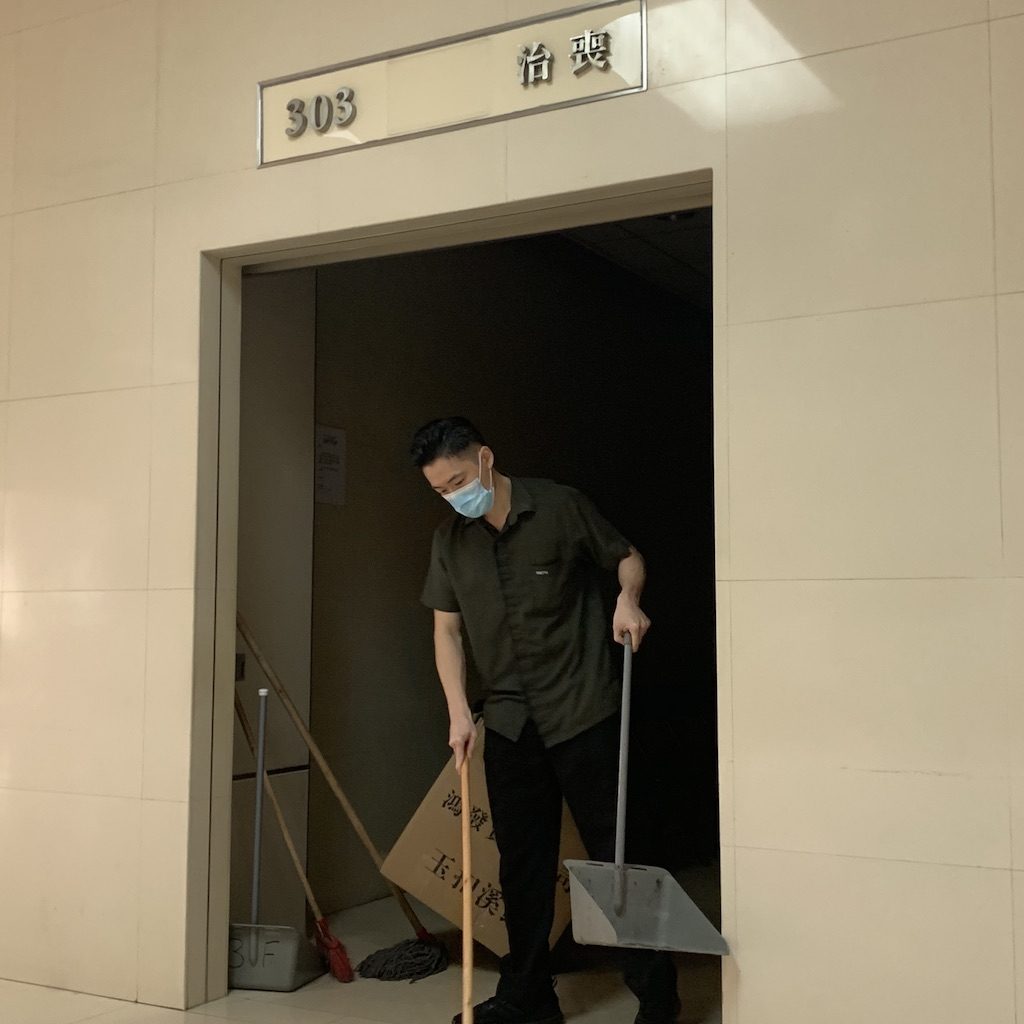
We saw a Taoist ceremony being held where family members queued up one after another led by the spiritual leader, burning incense joss sticks and muttering chants towards the sky. We also noticed how the coffin would leave each hall through the back door, because ‘the dead’ should not share the same entrance as the living. Funerals are also considered inappropriate for very young children to attend so they are predominantly adult affairs.
I managed to chat with the funeral director about some of the aspects, as he remarked how Hong Kong probably retained many of these so-called ‘superstitious’ but highly ritualised social customs that are no longer relevant in mainland China. These industrialists, when fleeing communist China back in the day, brought with them not only capital but a lot of the traditions governing the key milestones that are birth, marriage and death – much of this was lost during the cultural revolution on the Mainland.
The funeral parlour also seemed exceptionally busy and it only dawned on me that we were approaching the end of the sixth lunar month. Come the following month – seventh of the lunar year that is associated with death (think Halloween) – people preferred not to hold any funeral because it is considered double the bad luck. Death is still considered a massive taboo in Chinese culture.

Most of the condolences are barely spoken but rather expressed in an exchange and reciprocation of sorts. As I was manning the reception desk, I had to give out dollar-coins to the people who brought flower deliveries as a sign of thank you, and a white envelope to those who came to pay their last respects at the funeral parlour. These white envelopes contain a red label – these colours are signifiers for death and happy events respectively. It contains three items: a tissue paper (used to be a towel back in the day) to wipe away any tears, some money as a reciprocation to the kindness of being there and a sweet to counter the ‘bitter’ from the sadness at the funeral – that should be eaten right away as you do not want to carry this back home.
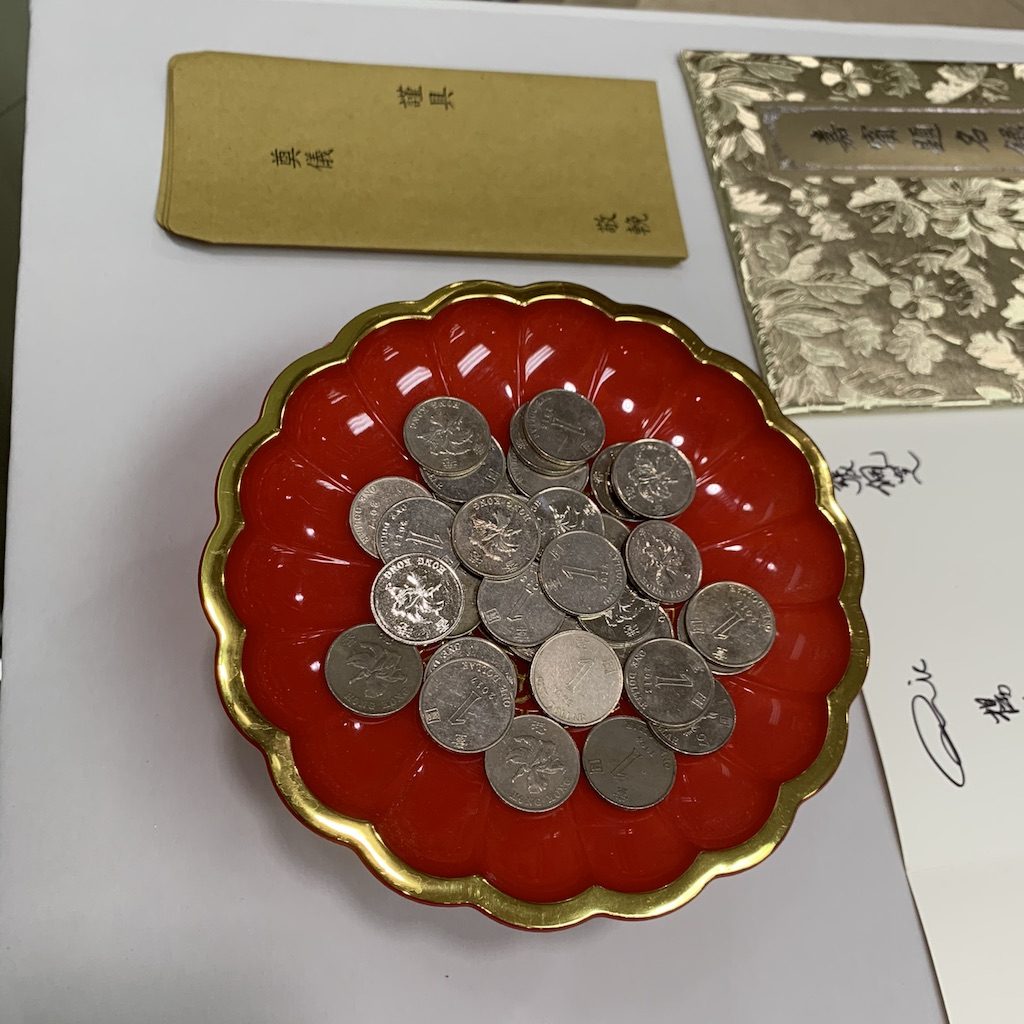
Dollar coins for those who delivered flowers 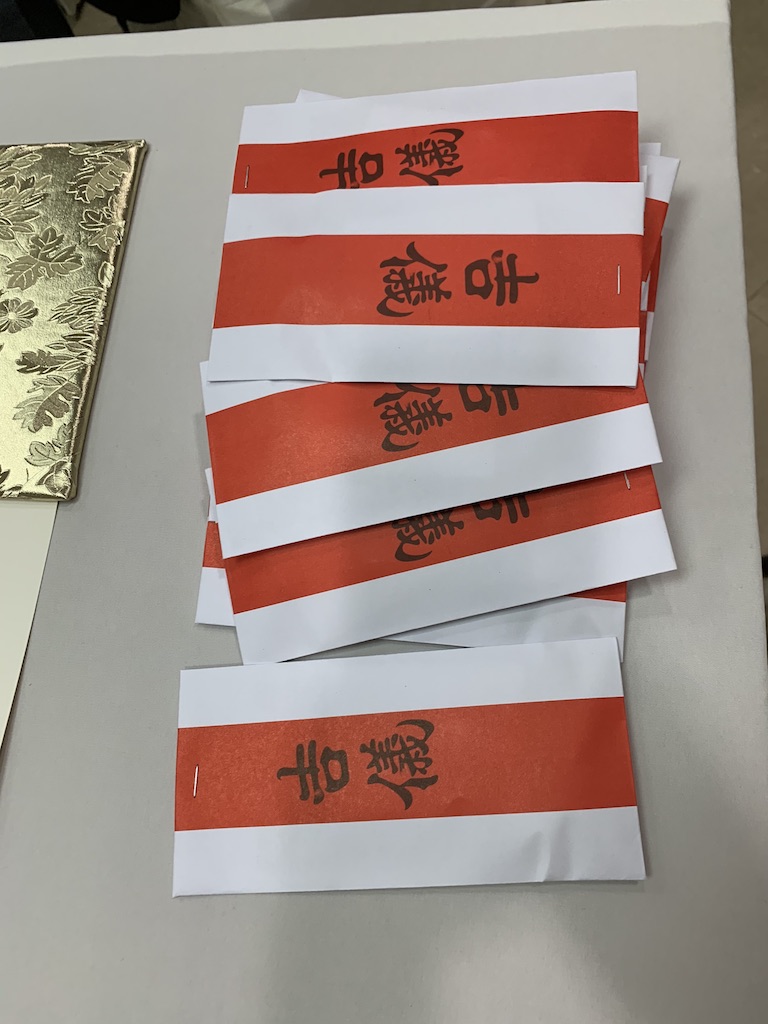
White and red envelopes
Following the cremation (at another location), all guests would get another red envelop (with money) as a reciprocation to thank them for coming. They should also walk over some burnt ashes to rid of any omen from taking part in a ‘white’ ceremony.
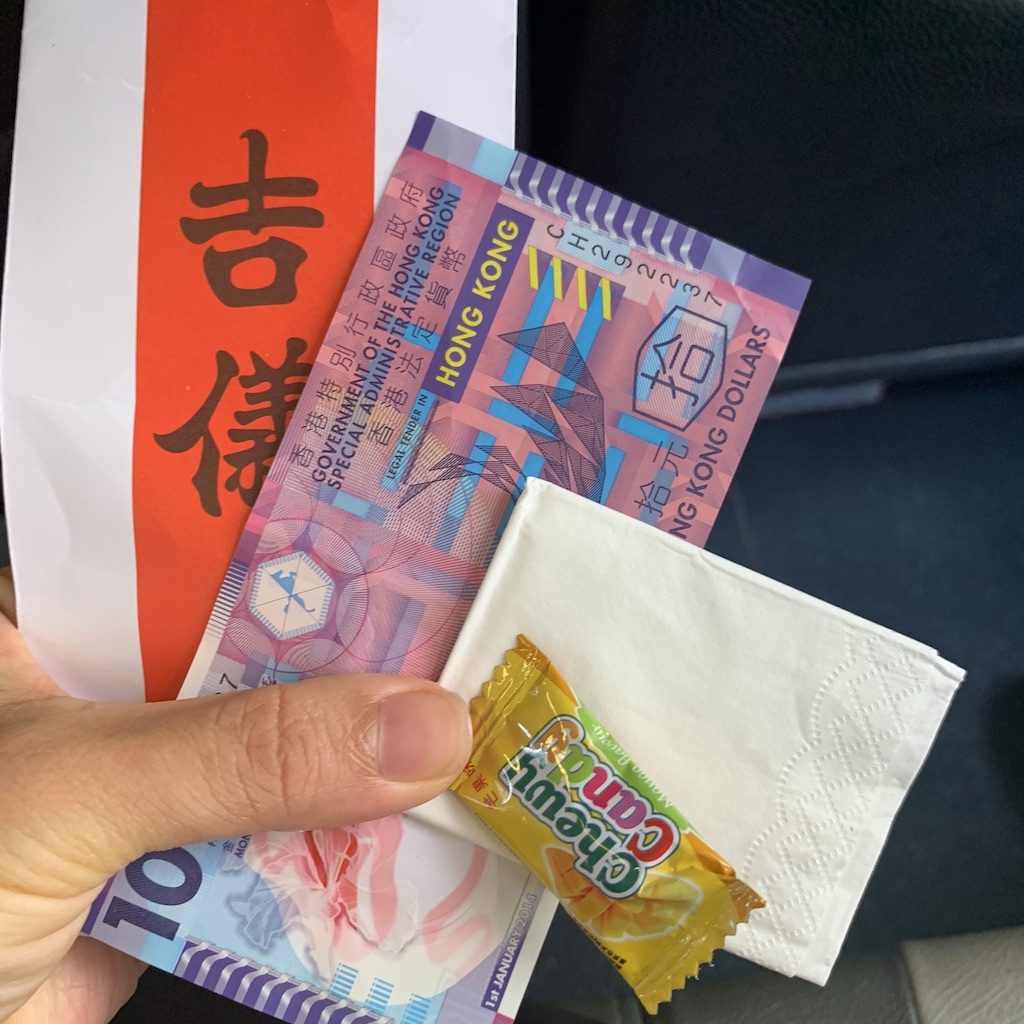
The white and red envelope 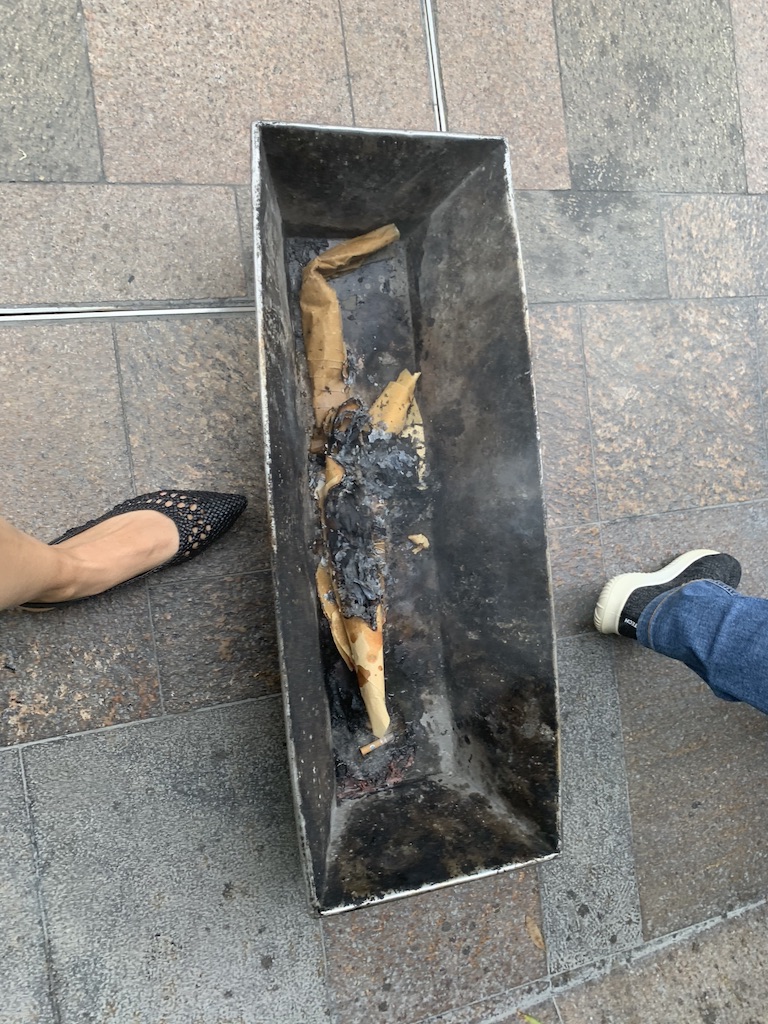
Walking over ashes
To end the ceremonial rites following the cremation service, we had a banquet-style meal, a kind of funeral reception for guests at a restaurant next door. Due to current social distancing rules in Hong Kong, no more than two people are allowed per table, so we were all scattered in pairs across the room.
This meal comprised of 8 courses, a rounded number that symbolises ‘all good things’ and classic banquet dishes including roast pork, chicken, fish and seafood as well as vegetarian items as a thank you to those who took part in the procession. It also finished with a ‘sweet (almond) soup’ as dessert.
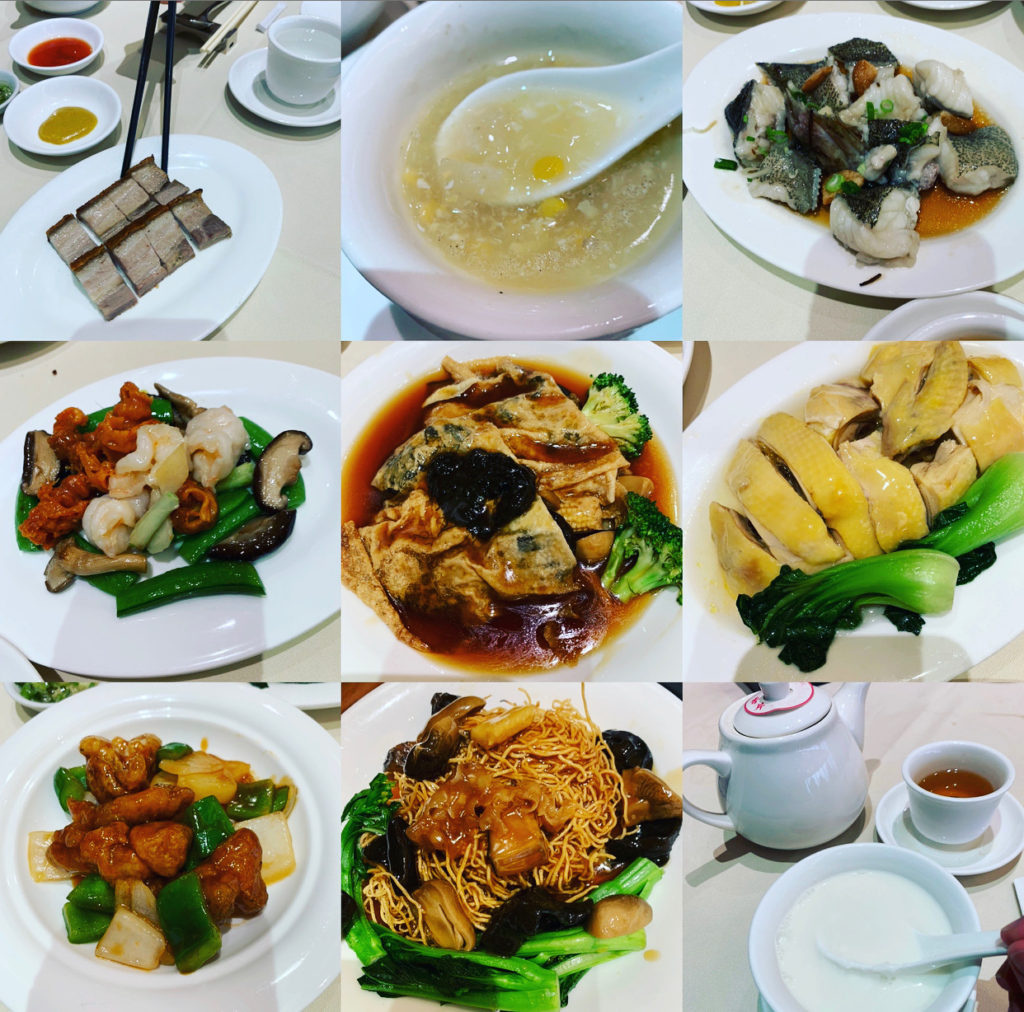
I remember a colleague once said to me when we got married, enjoy your wedding – this is the only time that all your friends would come celebrate you, and although it sounds morbid, the next time that will be at your funeral. This really stuck with me. Although many aspects from these rituals could come across as redundant and oddly superstitious (perhaps ridiculous even) for those unfamiliar with the culture and possibly for young people, there is a strong social element in end-of-life rituals where old friends and acquaintances gather.
In an age where many families have shrunk in size and perhaps with generations and members who live far apart, perhaps some of these rituals may no longer have their place in the future. But whilst they last, what is important is that there is a strong sense of comfort and completion to follow these for those who still live, and a way to celebrate somebody whose legacy mattered.
In loving memory of Mr David H Yang Sr. 楊錫育先生 (1932-2020)

Thanks for revealing your ideas in this article. The other factor is that each time a problem occurs with a pc motherboard, folks should not have some risk connected with repairing it themselves because if it is not done right it can lead to irreparable damage to an entire laptop. In most cases, it is safe just to approach the dealer of the laptop for that repair of that motherboard. They’ve got technicians who have an know-how in dealing with pc motherboard complications and can have the right prognosis and perform repairs.
Thank you for another informative blog. Where else could I get that type of info written in such a perfect way? I’ve a project that I am just now working on, and I’ve been on the look out for such info.
You made some decent factors there. I seemed on the internet for the difficulty and found most people will go along with together with your website.
hello!,I love your writing very a lot! share we keep up a correspondence more approximately your article on AOL? I require an expert in this area to resolve my problem. Maybe that is you! Looking forward to see you.
Hi there, You’ve done a great job. I抣l definitely digg it and in my view recommend to my friends. I’m sure they’ll be benefited from this site.
Hello my friend! I wish to say that this article is awesome, nice written and include almost all significant infos. I抎 like to see more posts like this.
My spouse and I absolutely love your blog and find nearly all of your post’s to be exactly I’m looking for. Would you offer guest writers to write content for you? I wouldn’t mind composing a post or elaborating on a few of the subjects you write about here. Again, awesome site!
Thanks so much for providing individuals with such a terrific possiblity to discover important secrets from this website. It’s always very terrific and jam-packed with a great time for me personally and my office colleagues to search your site more than three times every week to read the new issues you will have. And indeed, I’m usually contented with the stunning creative ideas you serve. Some 1 points in this post are without a doubt the simplest we have all had.
It抯 actually a great and helpful piece of information. I抦 happy that you shared this helpful information with us. Please keep us informed like this. Thanks for sharing.
certainly like your web site but you have to check the spelling on quite a few of your posts. Many of them are rife with spelling problems and I find it very bothersome to tell the truth nevertheless I will certainly come back again.
Howdy! I simply want to give a huge thumbs up for the great data you’ve right here on this post. I shall be coming back to your blog for more soon.
Wow! Thank you! I continually wanted to write on my website something like that. Can I implement a fragment of your post to my site?
Your artwork is a feast for the eyes! The colors, details, and emotions conveyed are nothing short of mesmerizing. You’re a true artist.
Hello, I’m really sorry about your loss. It seems like food provided at the wake were simply classic Cantonese dishes, and maybe some favourites of the deceased. Sending warm wishes to you and the family at this difficult time.
Hi there
The food afther the funeral can you please got the name of the dishes
My father has pass away and the restaurant don’t know anything about the food
We live in the netherland
So we want to get as close to order the food if we can
Tnx for info if you reply